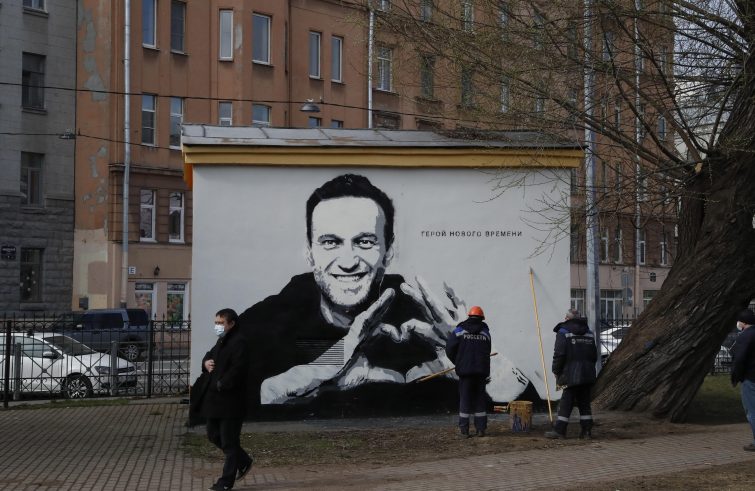
In response to a question on the subject of Aleksey Navalny, the Archbishop of Moscow, Msgr Paolo Pezzi, read a statement released a few days ago by Fr Aleksey Uminiskiy, a Russian priest, that “touched me personally”: “To me, as a priest, the name of the convict, his surname, the article of the Criminal Code pursuant to which he was convicted, is of no great importance. Christ’s words, which invite us to treat any prisoner as Himself, has immense value for me.” Protests in Russia are ongoing, with thousands taking to the streets again on 21st April asking for the release of Aleksey Navalny. More than 1800 people were detained in the last 24 hours and 11,000 have been put in prison since the dissident’s return to Russia from Germany. Most of the detentions at the latest demonstrations – 805 people – occurred in St Petersburg, Russia’s second largest city, where numerous incidents of police brutality were also reported. “The protests signal an underlying malaise ignited by the developments in Navalny’s personal situation. In this case, it appears that the protests focus more on the jail conditions than on the demands and expectations of the population”, said Msgr. Pezzi.
 The Navalny case is a cause for concern also in Europe. How can this be resolved?
The Navalny case is a cause for concern also in Europe. How can this be resolved?
It is above all a political question. Addressing those with the power to intervene, Fr Aleksey Uminiskiy added: “Please, listen to the words of Christ. Have mercy, do not turn a man’s imprisonment into torture or mockery. It is up to each one of us to be true to our human nature always and in every circumstance.” To me this is a sensible, humane and Christian way of dealing with a situation that is certainly not pleasant for anyone.
What are you asking for as Churches?
I would like to recall the figure of Fjodor Petrovich Haass, whose beatification process is underway. He was a German physician who lived in the 19th century and spent almost his entire life in Russia. He devoted his medical activity to treating the poor and Russian prisoners, for whom he struggled day after day to improve their living conditions. Through the intercession of Haass,
we are asking that the innocent receive justice, the guilty be granted mercy, those charged with delivering judgement do so with intelligence, courage and wisdom and, above all, that those responsible for enforcing the sentence do so with humaneness.
Are words acted upon?
It is my belief that the Churches have the duty to highlight, with words, the importance of humane political action. The task of Russian society, and beyond Russia, is to take these words seriously, not to consider them “religious”, thus confining them to a sphere deemed to be unrelated to political and social action. These words offer the opportunity to effectively change the situation we are experiencing. However, I believe it would be reductive to apply this thought to Russian society alone. In fact it involves all the Churches in Europe and in the rest of the world:
to remind decision-makers that their decisions should be made for the common good, for the good of the human person, respectful of human dignity, from conception to the last breath of life.
Acting on these principles detracts nothing from the economic and political aspects. On the contrary, it is an asset for society. This is the task of the Churches: to remember this and to pray to the Lord that the hearts of those called to exercise power on behalf of the people may embrace these principles for the benefit of their people and the greater good of society.
Russian authorities have expelled an Italian diplomat, declared ‘persona non grata’ and ordered to leave the country within 24 hours. How are you experiencing this situation? And how should these diplomatic crises be tackled?
I think that it should never be forgotten that it is a matter of serving the common good.
During Lent we prayed for political leaders to be concerned not only about the good of their own nation, but about the good of the whole of humanity. The message is enshrined in the Pope’s two most recent encyclicals, namely, that individual responsibility is also a responsibility for the whole world. As regards the specifics of the diplomatic crisis, I must say that it is a worrying situation. It is an exchange of diplomatic sanctions that involves not only Italy but the relations with various States.
In the light of the Encyclical ” Fratelli Tutti ” (All Brothers), what is the message for Russia today?
I think the message is the title itself. We must open up to others, without focusing on ourselves, on our own problems, because those are and always will be there. We must lift up our gaze to discover that those who are close to us, even if they are strangers, speaking a foreign language, belonging to a different ethnic group or of a different religion, possess something deeper that makes us brothers. That deeper something is the heart of man and God Himself.
If we manage to understand this, then human fraternity can become a real and effective opportunity for weaving new relationships and building a civilisation based on truth and love among us.











